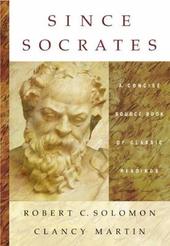
|
Since Socrates: A Concise Source Book of Classic Readings
Paperback / softback
Main Details
| Title |
Since Socrates: A Concise Source Book of Classic Readings
|
| Authors and Contributors |
By (author) Robert Solomon
|
|
By (author) Clancy Martin
|
| Physical Properties |
| Format:Paperback / softback | | Pages:654 | | Dimensions(mm): Height 234,Width 162 |
|
| Category/Genre | Philosophy |
|---|
| ISBN/Barcode |
9780534633288
|
| Classifications | Dewey:109 |
|---|
| Audience | | Tertiary Education (US: College) | |
|---|
| Edition |
New edition
|
|
Publishing Details |
| Publisher |
Cengage Learning, Inc
|
| Imprint |
Wadsworth Publishing Co Inc
|
| Publication Date |
21 May 2004 |
| Publication Country |
United States
|
Description
Understand and analyze the great historical texts in philosophy with SINCE SOCRATES! Designed as a concise source book, this historically organized anthology provides you the tools you need to get a good grade. The readings are centered on three critical questions: ethics and the quest for the good life, truth and the problem of knowledge, and the existence of God. Brief introductions to each reading give essential biographical and contextual information on each of the philosophers to enhance your understanding. Studying is made easy with the book-specific website that contains tools such as essay questions, web links, and tutorial quizzes.
Author Biography
Clancy Martin has published textbooks and articles on business ethics, normative ethics, and 19th century European philosophy. In 2003 he co-authored, also with Robert Solomon, the third edition of ABOVE THE BOTTOM LINE. He is an assistant professor at the University of Missouri at Kansas City, and has taught at Southwestern University, St. Edward's University, and the University of Texas at Austin. Robert C. Solomon (1942-2007) was internationally renowned as a teacher and lecturer in philosophy. He was Quincy Lee Centennial Professor and Distinguished Teaching Professor at the University of Texas at Austin. He received his Ph.D. from the University of Michigan and over the course of his career taught at numerous institutions, including Princeton University, the University of Pittsburgh, the University of Auckland, and the University of California, in addition to the University of Texas. He authored more than 40 books, including INTRODUCING PHILOSOPHY, A SHORT HISTORY OF PHILOSOPHY, THE PASSIONS, IN THE SPIRIT OF HEGEL, ABOUT LOVE, ABOVE THE BOTTOM LINE, Fourth Edition (with Clancy Martin), ETHICS AND EXCELLENCE, THE JOY OF PHILOSOPHY, and TRUE TO OUR FEELINGS, and he was co-editor of TWENTY QUESTIONS, Fifth Edition (with Lee Bowie and Meredith Michaels), and SINCE SOCRATES (with Clancy Martin).
ReviewsIntroduction. Timeline. PROLOGUE: BEFORE SOCRATES. The Vedas, Brahman, and Buddhism. Rg Veda. Bhagavad Gita. Teachings of the Buddha. Confucianism. Confucius/The Analects. Taoism. Lao-Tze/Tao Te Ching. Chuang Tze/Selections. The Pre-Socratics. Thales/Selections. Pythagoras/Selections. Heraclitus/Selections. Parmenides/The Way of Truth. 1. SOCRATES AND PLATO. Apology. Euthyphro. Crito. Meno. Phaedo. Symposium. Phaedrus. Republic. 2. ARISTOTLE. Nicomachean Ethics. Categories. Metaphysics. Physics. 3. SEXTUS EMPIRICUS. From Outlines of Pyrrhonism. 4. ST. AUGUSTINE. The Problem of Evil (City of God, XI, XIV). 5. ST. ANSELM. The Ontological Proof of God. 6. ST. THOMAS AQUINAS. The Five Ways. 7. THOMAS HOBBES. Leviathan (13-15). 8. RENE DESCARTES. Meditations. 9. JOHN LOCKE. Essay on Human Understanding. From An Essay Concerning Human Understanding. On Personal Identity. From The Second Treatise on Government. 10. GOTTFRIED WILHELM VON LEIBNIZ. Monadology. 11. BISHOP GEORGE BERKELEY. Of the Principles of Human Knowledge. 12. DAVID HUME. Enquiry Concerning Human Understanding. There Is No Self. Enquiry Concerning Human Understanding (continued). Treatise of Human Nature. From Enquiry Concerning Human Understanding. 13. IMMANUEL KANT. Critique of Pure Reason. Groundwork of the Metaphysics of Morals. 14. G.W.F. HEGEL. The Phenomenology of Spirit. 15. SOREN KIERKEGAARD. Concluding Unscientific Postscript to Philosophical Fragments. 16. JOHN STUART MILL. Utilitarianism. On Liberty. 17. FRIEDRICH NIETZSCHE. Gay Science. Beyond Good and Evil. The Genealogy of Morality. Twilight of the Idols. On Truth. On the Will to Power. On Eternal Recurrence. 18. WILLIAM JAMES. The Will to Believe. 19. BERTRAND RUSSELL. The Problems of Philosophy. 20. LUDWIG WITTGENSTEIN. Philosophical Investigations. 21. JEAN-PAUL SARTRE. Existentialism Is a Humanism. Being and Nothingness. 22. SIMONE DE BEAUVIOR. The Ethics of Ambiguity. 23. MICHEL FOUCAULT. Truth and Power.
|